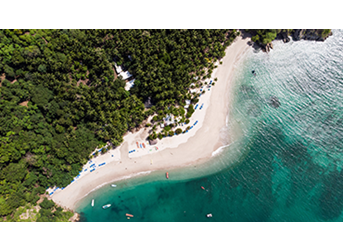How to move to Costa Rica
Get the most out of your money when you move



Guide on emigrating to Costa Rica
7 minute readMultitudes of expats have chosen to move to Costa Rica in search of sun, sand and a more relaxed pace of life. This tropical haven offers beautiful landscapes, miles of coastal beaches and a good healthcare system, and so it is no surprise that it is also home to large expat communities from around the world.
Let’s take a look at what budding expats need to know before they emigrate to Costa Rica in order to ensure that their move is a smooth, seamless one.
Why move to Costa Rica?
Costa Rica’s vast coastlines, tropical forests and eco-friendly status are amongst the main reasons for expats flocking to Costa Rica. The cost of living is also fairly low, with much cheaper utilities, food and property prices than in the UK. Many enjoy the famously laid-back Costa Rican lifestyle, which is perhaps best described by the country’s national saying, 'pura vida’, which translates to ‘pure life’.
Requirements to move to Costa Rica
UK citizens do not currently require a visa to enter Costa Rica and are legally entitled to stay up to 90 days. However, if you wish to move permanently to Costa Rica full-time, you will be required to apply for a work or residence visa with the Costa Rican Department of Immigration. We recommend that you seek professional help for your application.
If you are looking to retire to Costa Rica, the Pensionado visa program might best suit your needs. Those who receive a lifetime monthly pension of $1,000 are eligible to apply for this scheme. Another generous program is the Rentista program. Popular amongst freelancers and digital nomads, this scheme requires that a deposit of $60,000 be made in an approved Costa Rican bank account, with $2,500 withdrawn every month. Holders of the Rentista visa are not permitted to work as employees, but they can own businesses and receive dividends.
How to open a bank account in Costa Rica
There is a wide range of banks in Costa Rica. These include the Central Bank (the Banco Central) and three state-owned commercial banks: the Banco Nacional de Costa Rica (BNCR), the Banco de Costa Rica (BCR) and Banco Crédito Agricola de Cartago (BCAC). Citibank and Scotiabank are amongst the private banks found in Costa Rica. Whilst the public banks in Costa Rica are laden with more bureaucracy than the private banks, they are regarded as more reliable, given that they are state-funded, insure all of your money and guarantee all deposits.
Most Costa Rican banks offer accounts in both Costa Rica colones (CRC) and United States dollars (USD). In order to open a standard account with most banks in the country, you will need to provide the following:
- Residency identity cards (DMIEX)
- Proof of address (utility bill or lease agreement)
- Proof of employment (if on a work visa)
- Proof of income (if on a retiree visa)
- A minimum deposit (this varies depending on your bank and account type)
Send money to Costa Rica
If you’re considering starting a new life in Costa Rica, you’ll need to prepare yourself financially. Whilst Costa Rica is a relatively inexpensive country in certain regards, you’ll still want to get the best value for money. This means ensuring that you avoid losing money through poor exchange rates and costly transfer fees.
Opening a Moneycorp account allows you to send money between your Costa Rican and UK bank accounts with ease. You’ll also benefit from great exchange rates and low transfer fees, helping ensure that your money goes further when you make international payments.
Contact one of our currency experts today to discuss what is involved in sending money to Costa Rica, and learn about the documentation that you will need to provide for your transfers.
What is the cost of living in Costa Rica?
The cost of living in Costa Rica is much lower than in the UK and the USA. According to Numbeo, consumer prices, rent prices and groceries are all considerably cheaper in Costa Rica than in the UK, and it is estimated that the overall cost of living in Costa Rica is less than half of that in the United Kingdom. The cost of public transport is low; travel by bus is very cheap. Air travel is also an affordable means of reaching Costa Rica’s more remote areas.
The cost of living will vary, of course, depend on where you choose to settle in Costa Rica, with those living in tourist destinations having to pay more on a monthly basis. As a general rule, however, most people should be able to live well in Costa Rica with $2,000 (£1,500-£1,800) a month.
Where should you choose to live in Costa Rica?
Think carefully about the climate that you enjoy the most, and the sorts of activities that you most enjoy. If you’re an avid surfer and swimmer, it would make the most sense to opt for a property near one of Costa Rica’s stunning beaches. The beach towns of Dominical and Tamarindo, for example, are a surfer’s paradise, offering a wonderful selection of restaurants, bars and vibrant nightlife.
Whilst Costa Rica’s beaches have much to recommend them, they are markedly hotter and more humid than the mountainous regions. Those looking for cooler weather are better suited to the Central Valley, which is located near San Jose, and the surrounding towns (Grecia, Atenas and Escazu). Whilst these areas are well-served by restaurants and hospitals, it is worth bearing in mind that there are generally fewer amenities in the rural areas than there are near the coastline.
Finding rentals and buying a house
If you are looking to rent a property in Costa Rica, it is likely that you will have to provide a letter of reference from your previous landlord and proof of sufficient finances; similarly, when purchasing property, you will need to provide valid ID (such as a passport) and proof of good financial standing.
It is a common practice for people to acquire a short-term rental in the area that they want to live, before searching for longer-term rentals upon arriving. Rent prices are highest in San José, the capital city, but they are still much lower than in the UK. A one-bedroom apartment in the city centre costs approximately £370 per month - significantly lower than the cost that would be incurred in Britain.
Buying vs. bringing a car
Many expatriates choose to buy a used car in Costa Rica because the cost of importing vehicles is very high; the Costa Rican government imposes a sliding import tax of 45-85% of the value of the vehicle.
The good news is that, as of 2021, certain people who bring cars into Costa Rica are exempt from paying this vehicle import tax. Retirees, investors and holders of Rentista visas can bring up to two vehicles into the country every ten years without having to pay any tax.
Residency for UK citizens
There are a number of options available to those looking to move to Costa Rica from the UK.
Retirees are eligible to apply for permanent residency under Costa Rica’s Pensionado program, provided that they have a minimum income of $1,000 from a lifelong pension. The Inversionista program is another pathway: it grants residence to those who invest a minimum of $150,000 in Costa Rica in a business, commercial, or residential property.
For aspiring digital nomads who are not yet of retirement age, the Rentista scheme is open to UK citizens and other foreigners who wish to attain temporary residency in Costa Rica. Applicants must agree to deposit a minimum of $2,500 each month into their Costa Rican bank account. Whilst holders of the Rentista visa cannot work as employees, they can own businesses and receive dividends, and they are eligible to apply for permanent residency after three years.
Open an account to start transferring today
Discover our solutions
Tips on making the most for your money when you emigrate
Our News Hub offers plenty of easy-to-read guidance on how to emigrate abroad.




